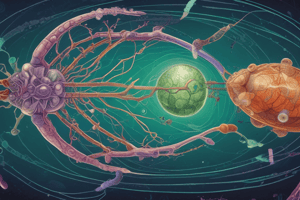Podcast
Questions and Answers
माइटोसिस और मेइओसिस के बीच क्या अंतर है?
माइटोसिस और मेइओसिस के बीच क्या अंतर है?
माइटोसिस और मेइओसिस दो विशेष प्रकार की कोशिका विभाजन प्रक्रियाएँ हैं जो यूकेरियोटिक जीवों में होती हैं। माइटोसिस में एकीकरण और वृद्धि होती है जबकि मेइओसिस में विकास और वंशानुक्रमण घटित होता है।
मानव पाचन तंत्र: इसमें कौन-कौन से अंग और प्रक्रियाएँ शामिल हैं और इनका महत्व क्या है?
मानव पाचन तंत्र: इसमें कौन-कौन से अंग और प्रक्रियाएँ शामिल हैं और इनका महत्व क्या है?
मानव पाचन तंत्र आहार को पचाने और शरीर को ऊर्जा और पोषण प्रदान करने के लिए विभिन्न अंगों और प्रक्रियाओं से मिलकर काम करता है। इसका महत्व हमारे शरीर के स्वास्थ्य और विकास के लिए है।
नाइट्रोजन परिपथ क्या है और इसका महत्व क्या है?
नाइट्रोजन परिपथ क्या है और इसका महत्व क्या है?
नाइट्रोजन परिपथ एक प्रक्रिया है जिसमें नाइट्रोजन वायुमंडल, समुद्र और मृदा के माध्यम से घूमता है। यह पौधों और जीवों के लिए आवश्यक है क्योंकि नाइट्रोजन खाद्यांश के रूप में प्राकृतिक वातावरण में प्रवेश करता है।
Study Notes
Introduction
Science is a vast field that encompasses various disciplines, and one of the most exciting areas is biology. Biology is the study of living organisms, focusing on their origin, anatomy, physiology, development, evolution, and behavior. In this article, we will explore some of the most fascinating subtopics in biology, including:
- Biochemistry: The study of chemical processes within living organisms.
- Biophysics: The application of physics principles to biological systems.
- Cell Biology (Cytology): The study of cells, their structure, and function.
- Genetics: The study of genes, their inheritance, and their interaction with the environment.
- Molecular Genetics: The study of the molecular structure and function of genes and their products.
- Population Genetics: The study of genetic variation and changes in populations.
- Evolutionary Biology: The study of how species evolve and adapt to their environments.
- Ecology: The study of the relationships between organisms and their environments.
- Environmental Biology: The study of how biological processes interact with and affect the natural world.
- Marine Biology: The study of life in aquatic environments, including marine organisms and ecosystems.
Biology Sub-disciplines
Biology is a vast field with numerous sub-disciplines, each focusing on different aspects of living organisms. Some of the key sub-disciplines include:
- Biochemistry
- Biophysics
- Cell Biology (Cytology)
- Genetics
- Molecular Genetics
- Classical Genetics
- Genomics
- Population Genetics
- Anatomy
- Physiology (Animal, Plant, Fungal, Bacterial, etc.)
- Nutrition
- Microbiology
- Virology
- Bacteriology
- Protozoology
- Mycology
- Botany
- Economic Botany
- Plant Pathology
- Bryology
- Phycology
- Horticulture
- Zoology
- Invertebrate Zoology
- Entomology
- Parasitology
- Vertebrate Zoology
- Evolutionary Biology
- Paleontology
- Medicine (Human and Non-Human Medicine)
- Pharmacology
- Pathology
- Forensics
- Toxicology
- Ichthyology
- Herpetology
- Ornithology
- Mammalogy
- Endocrinology
- Neurobiology
- Cognitive Neuroscience
- Immunology
- Immunopathology
- Developmental Biology (Embryology)
- Ethology (Animal Behavior)
- Sociobiology
- Marine Biology
- Systematics/Taxonomy (specializing in certain groups)
Important Biology Topics
Some important topics in biology include:
- Photosynthesis: The process observed in plants and certain microscopic organisms that convert sunlight into chemical energy.
- Carbon Cycle: The process by which carbon moves through the atmosphere, oceans, and soil.
- Nitrogen Cycle: The process by which nitrogen moves through the atmosphere, oceans, and soil.
- Difference between Mitosis and Meiosis: The two types of cell division processes in eukaryotic organisms.
- Flora and Fauna: The plant and animal species found in various ecosystems.
- Human Digestive System: The organs and processes involved in the digestion of food in humans.
- Biomolecules: Molecules found in organisms, such as proteins, carbohydrates, and nucleic acids.
- Heredity: The set of processes where traits from parents are passed on to their offspring.
- Ecology: The branch of biology that deals with the relationships between organisms and their environments.
- Climate Change: The long-term shifts in temperatures and weather patterns across the Earth's surface.
Conclusion
Biology is a fascinating field with many sub-disciplines and topics to explore. From the fundamental processes of life to the complex interactions between organisms and their environments, biology offers countless opportunities for scientific discovery and personal growth. By studying biology, we can better understand the world around us and work towards solving some of the most pressing challenges faced by humanity.
Studying That Suits You
Use AI to generate personalized quizzes and flashcards to suit your learning preferences.
Description
Explore the diverse and captivating subtopics in biology, including biochemistry, biophysics, cell biology, genetics, evolutionary biology, ecology, and more. Delve into the intricate web of life's processes and interactions with the environment.




